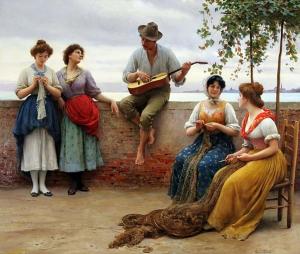Fox’s Book of Martyrs; Or, a History of the Lives, Sufferings and Triumphant Deaths of the Primitive Protestant Martyrs
Nonfiction, Religion & Spirituality, New Age, History, Fiction & Literature| Author: | John Foxe | ISBN: | 9781465553966 |
| Publisher: | Library of Alexandria | Publication: | March 8, 2015 |
| Imprint: | Language: | English |
| Author: | John Foxe |
| ISBN: | 9781465553966 |
| Publisher: | Library of Alexandria |
| Publication: | March 8, 2015 |
| Imprint: | |
| Language: | English |
This work is strictly what its title page imports, a COMPILATION. Fox’s “Book of Martyrs” has been made the basis of this volume. Liberty, however, has been taken to abridge wherever it was thought necessary;—to alter the antiquated form of the phraseology; to introduce additional information; and to correct any inaccuracy respecting matters of fact, which had escaped the author of the original work, or which has been found erroneous by the investigation of modern research. The object of this work, is to give a brief history of persecution since the first introduction of christianity, till the present time. In doing this, we have commenced with the martyrdom of Stephen, and following the course of events, have brought the History of persecution down to the year 1830. In all ages, we find that a disposition to persecute for opinion’s sake, has been manifested by wicked men, whatever may have been their opinions or sentiments on religious subjects. The intolerant jew, and the bigoted pagan, have exhibited no more of a persecuting spirit, than the nominal professor of christianity, and the _infidel_ and the avowed _atheist_. Indeed, it seems to be an “inherent vice,” in unsanctified nature to endeavour by the pressure of physical force, to restrain obnoxious sentiments, and to propagate favourite opinions. It is only when the heart has been renewed and sanctified by divine grace, that men have rightly understood and practised the true principles of toleration. We do not say that none but real christians have adopted correct views respecting civil and religious liberty;—but we affirm that these views owe their origin entirely to christianity and its genuine disciples. Though nearly all sects have persecuted their opponents, during a brief season, when men’s passions were highly excited, and true religion had mournfully declined, yet no denomination except the papal hierarchy, has adopted as an article of religious belief, and a principle of practical observance, the right to destroy heretics for opinion’s sake. The decrees of councils, and the bulls of popes, issued in conformity with those decrees, place this matter beyond a doubt. Persecution, therefore, and popery, are inseparably connected; because claiming infallibility, what she has once done is right for her to do again; yea, must be done under similar circumstances, or the claims of infallibility given up. There is no escaping this conclusion. It is right, therefore, to charge upon popery, all the persecutions and horrid cruelties which have stained the annals of the papal church during her long and bloody career of darkness and crime. Every sigh which has been heaved in the dungeons of the Inquisition—every groan which has been extorted by the racks and instruments of torture, which the malice of her bigoted votaries, stimulated by infernal wisdom, ever invented, has witnessed in the ear of God, against the “Mother of Harlots;” and those kings of the earth, who giving their power to the “Beast” have aided her in the cruel work of desolation and death. The valleys of Piedmont, the mountains of Switzerland, the vine crowned hills of Italy and France—and all parts of Germany and the low countries, have by turns, been lighted by the fires of burning victims, or crimsoned with the blood of those who have suffered death at the hands of the cruel emissaries of popery. England too, has drunken deep of the “wine of the fierceness of her wrath,” as the blood of Cobham, and the ashes of the Smithfield martyrs can testify. Ireland and Scotland, likewise, have each been made the theatre of her atrocities. But no where has the system been exhibited in its native unalleviated deformity, as in Spain, Portugal and their South American dependencies. For centuries, such a system of police was established by the _Holy Inquisitors_, that these countries resembled a vast whispering gallery, where the slightest murmur of discontent could be heard and punished. Such has been the effect of superstition and the terror of the Holy Office, upon the mind, as completely to break the pride of the Castillian noble, and make him the unresisting victim of every mendicant friar and “hemp-sandaled monk
This work is strictly what its title page imports, a COMPILATION. Fox’s “Book of Martyrs” has been made the basis of this volume. Liberty, however, has been taken to abridge wherever it was thought necessary;—to alter the antiquated form of the phraseology; to introduce additional information; and to correct any inaccuracy respecting matters of fact, which had escaped the author of the original work, or which has been found erroneous by the investigation of modern research. The object of this work, is to give a brief history of persecution since the first introduction of christianity, till the present time. In doing this, we have commenced with the martyrdom of Stephen, and following the course of events, have brought the History of persecution down to the year 1830. In all ages, we find that a disposition to persecute for opinion’s sake, has been manifested by wicked men, whatever may have been their opinions or sentiments on religious subjects. The intolerant jew, and the bigoted pagan, have exhibited no more of a persecuting spirit, than the nominal professor of christianity, and the _infidel_ and the avowed _atheist_. Indeed, it seems to be an “inherent vice,” in unsanctified nature to endeavour by the pressure of physical force, to restrain obnoxious sentiments, and to propagate favourite opinions. It is only when the heart has been renewed and sanctified by divine grace, that men have rightly understood and practised the true principles of toleration. We do not say that none but real christians have adopted correct views respecting civil and religious liberty;—but we affirm that these views owe their origin entirely to christianity and its genuine disciples. Though nearly all sects have persecuted their opponents, during a brief season, when men’s passions were highly excited, and true religion had mournfully declined, yet no denomination except the papal hierarchy, has adopted as an article of religious belief, and a principle of practical observance, the right to destroy heretics for opinion’s sake. The decrees of councils, and the bulls of popes, issued in conformity with those decrees, place this matter beyond a doubt. Persecution, therefore, and popery, are inseparably connected; because claiming infallibility, what she has once done is right for her to do again; yea, must be done under similar circumstances, or the claims of infallibility given up. There is no escaping this conclusion. It is right, therefore, to charge upon popery, all the persecutions and horrid cruelties which have stained the annals of the papal church during her long and bloody career of darkness and crime. Every sigh which has been heaved in the dungeons of the Inquisition—every groan which has been extorted by the racks and instruments of torture, which the malice of her bigoted votaries, stimulated by infernal wisdom, ever invented, has witnessed in the ear of God, against the “Mother of Harlots;” and those kings of the earth, who giving their power to the “Beast” have aided her in the cruel work of desolation and death. The valleys of Piedmont, the mountains of Switzerland, the vine crowned hills of Italy and France—and all parts of Germany and the low countries, have by turns, been lighted by the fires of burning victims, or crimsoned with the blood of those who have suffered death at the hands of the cruel emissaries of popery. England too, has drunken deep of the “wine of the fierceness of her wrath,” as the blood of Cobham, and the ashes of the Smithfield martyrs can testify. Ireland and Scotland, likewise, have each been made the theatre of her atrocities. But no where has the system been exhibited in its native unalleviated deformity, as in Spain, Portugal and their South American dependencies. For centuries, such a system of police was established by the _Holy Inquisitors_, that these countries resembled a vast whispering gallery, where the slightest murmur of discontent could be heard and punished. Such has been the effect of superstition and the terror of the Holy Office, upon the mind, as completely to break the pride of the Castillian noble, and make him the unresisting victim of every mendicant friar and “hemp-sandaled monk















